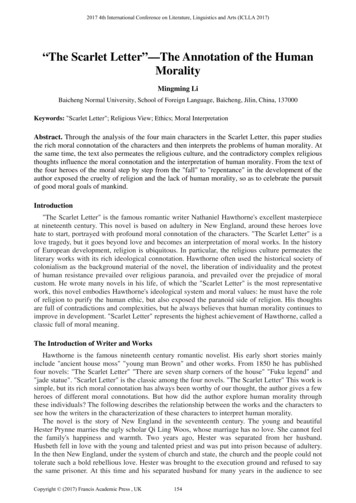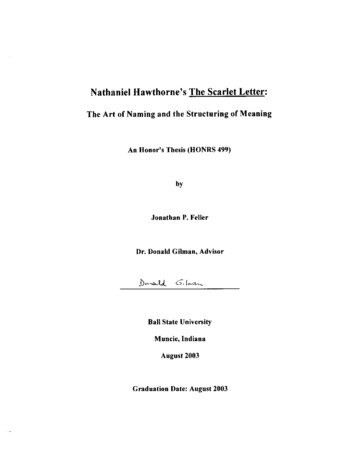
Transcription
The Scarlet LetterHawthorne, NathanielPublished: 1850Categorie(s): Fiction, Romance, GothicSource: http://gutenberg.org1
About Hawthorne:Nathaniel Hawthorne was born on July 4, 1804, in Salem,Massachusetts, where his birthplace is now a museum. WilliamHathorne, who emigrated from England in 1630, was the firstof Hawthorne's ancestors to arrive in the colonies. After arriving, William persecuted Quakers. William's son John Hathornewas one of the judges who oversaw the Salem Witch Trials.(One theory is that having learned about this, the author addedthe "w" to his surname in his early twenties, shortly aftergraduating from college.) Hawthorne's father, NathanielHathorne, Sr., was a sea captain who died in 1808 of yellowfever, when Hawthorne was only four years old, in Raymond,Maine. Hawthorne attended Bowdoin College at the expense ofan uncle from 1821 to 1824, befriending classmates HenryWadsworth Longfellow and future president Franklin Pierce.While there he joined the Delta Kappa Epsilon fraternity. Untilthe publication of his Twice-Told Tales in 1837, Hawthornewrote in the comparative obscurity of what he called his "owl'snest" in the family home. As he looked back on this period ofhis life, he wrote: "I have not lived, but only dreamed about living." And yet it was this period of brooding and writing thathad formed, as Malcolm Cowley was to describe it, "the centralfact in Hawthorne's career," his "term of apprenticeship" thatwould eventually result in the "richly meditated fiction."Hawthorne was hired in 1839 as a weigher and gauger at theBoston Custom House. He had become engaged in the previousyear to the illustrator and transcendentalist Sophia Peabody.Seeking a possible home for himself and Sophia, he joined thetranscendentalist utopian community at Brook Farm in 1841;later that year, however, he left when he became dissatisfiedwith farming and the experiment. (His Brook Farm adventurewould prove an inspiration for his novel The Blithedale Romance.) He married Sophia in 1842; they moved to The OldManse in Concord, Massachusetts, where they lived for threeyears. There he wrote most of the tales collected in Mossesfrom an Old Manse. Hawthorne and his wife then moved toSalem and later to the Berkshires, returning in 1852 to Concord and a new home The Wayside, previously owned by theAlcotts. Their neighbors in Concord included Ralph WaldoEmerson and Henry David Thoreau. Like Hawthorne, Sophia2
was a reclusive person. She was bedridden with headaches until her sister introduced her to Hawthorne, after which herheadaches seem to have abated. The Hawthornes enjoyed along marriage, often taking walks in the park. Sophia greatlyadmired her husband's work. In one of her journals, she writes:"I am always so dazzled and bewildered with the richness, thedepth, the jewels of beauty in his productions that I am always looking forward to a second reading where I can ponderand muse and fully take in the miraculous wealth of thoughts."In 1846, Hawthorne was appointed surveyor (determining thequantity and value of imported goods) at the Salem CustomHouse. Like his earlier appointment to the custom house in Boston, this employment was vulnerable to the politics of thespoils system. A Democrat, Hawthorne lost this job due to thechange of administration in Washington after the presidentialelection of 1848. Hawthorne's career as a novelist was boostedby The Scarlet Letter in 1850, in which the preface refers tohis three-year tenure in the Custom House at Salem. TheHouse of the Seven Gables (1851) and The Blithedale Romance(1852) followed in quick succession. In 1852, he wrote thecampaign biography of his old friend Franklin Pierce. WithPierce's election as president, Hawthorne was rewarded in1853 with the position of United States consul in Liverpool. In1857, his appointment ended and the Hawthorne family touredFrance and Italy. They returned to The Wayside in 1860, andthat year saw the publication of The Marble Faun. Failinghealth (which biographer Edward Miller speculates was stomach cancer) prevented him from completing several more romances. Hawthorne died in his sleep on May 19, 1864, in Plymouth, New Hampshire while on a tour of the White Mountainswith Pierce. He was buried in Sleepy Hollow Cemetery, Concord, Massachusetts. Wife Sophia and daughter Una were originally buried in England. However, in June 2006, they werere-interred in plots adjacent to Nathaniel. Nathaniel andSophia Hawthorne had three children: Una, Julian, and Rose.Una was a victim of mental illness and died young. Julianmoved out west, served a jail term for embezzlement and wrotea book about his father. Rose married George Parsons Lathropand they became Roman Catholics. After George's death, Rosebecame a Dominican nun. She founded the Dominican Sisters3
of Hawthorne to care for victims of incurable cancer. Source:WikipediaAlso available on Feedbooks for Hawthorne:The House of the Seven Gables (1851)The Minister's Black Veil (1837)Rappaccini's Daughter (1844)The Birth-Mark (1843)Biographical Stories (1842)Young Goodman Brown (1835)The Blithedale Romance (1852)Fire Worship (1843)The Marble Faun (1860)Dr. Heidegger's Experiment (1837)Note: This book is brought to you by Feedbookshttp://www.feedbooks.comStrictly for personal use, do not use this file for commercialpurposes.4
INTRODUCTORY TO "THE SCARLET LETTER"It is a little remarkable, that—though disinclined to talk overmuch of myself and my affairs at the fireside, and to my personal friends—an autobiographical impulse should twice in mylife have taken possession of me, in addressing the public. Thefirst time was three or four years since, when I favoured thereader—inexcusably, and for no earthly reason that either theindulgent reader or the intrusive author could imagine—with adescription of my way of life in the deep quietude of an OldManse. And now—because, beyond my deserts, I was happyenough to find a listener or two on the former occasion—Iagain seize the public by the button, and talk of my threeyears' experience in a Custom-House. The example of the famous "P. P. , Clerk of this Parish," was never more faithfully followed. The truth seems to be, however, that when he casts hisleaves forth upon the wind, the author addresses, not the manywho will fling aside his volume, or never take it up, but the fewwho will understand him better than most of his schoolmatesor lifemates. Some authors, indeed, do far more than this, andindulge themselves in such confidential depths of revelation ascould fittingly be addressed only and exclusively to the oneheart and mind of perfect sympathy; as if the printed book,thrown at large on the wide world, were certain to find out thedivided segment of the writer's own nature, and complete hiscircle of existence by bringing him into communion with it. It isscarcely decorous, however, to speak all, even where we speakimpersonally. But, as thoughts are frozen and utterance benumbed, unless the speaker stand in some true relation withhis audience, it may be pardonable to imagine that a friend, akind and apprehensive, though not the closest friend, is listening to our talk; and then, a native reserve being thawed by thisgenial consciousness, we may prate of the circumstances thatlie around us, and even of ourself, but still keep the inmost Mebehind its veil. To this extent, and within these limits, an author, methinks, may be autobiographical, without violatingeither the reader's rights or his own.It will be seen, likewise, that this Custom-House sketch has acertain propriety, of a kind always recognised in literature, asexplaining how a large portion of the following pages came5
into my possession, and as offering proofs of the authenticity ofa narrative therein contained. This, in fact—a desire to put myself in my true position as editor, or very little more, of themost prolix among the tales that make up my volume—this, andno other, is my true reason for assuming a personal relationwith the public. In accomplishing the main purpose, it has appeared allowable, by a few extra touches, to give a faint representation of a mode of life not heretofore described, togetherwith some of the characters that move in it, among whom theauthor happened to make one.In my native town of Salem, at the head of what, half a century ago, in the days of old King Derby, was a bustlingwharf—but which is now burdened with decayed wooden warehouses, and exhibits few or no symptoms of commercial life;except, perhaps, a bark or brig, half-way down its melancholylength, discharging hides; or, nearer at hand, a Nova Scotiaschooner, pitching out her cargo of firewood—at the head, Isay, of this dilapidated wharf, which the tide often overflows,and along which, at the base and in the rear of the row ofbuildings, the track of many languid years is seen in a borderof unthrifty grass—here, with a view from its front windowsadown this not very enlivening prospect, and thence across theharbour, stands a spacious edifice of brick. From the loftiestpoint of its roof, during precisely three and a half hours of eachforenoon, floats or droops, in breeze or calm, the banner of therepublic; but with the thirteen stripes turned vertically, insteadof horizontally, and thus indicating that a civil, and not a military, post of Uncle Sam's government is here established. Itsfront is ornamented with a portico of half-a-dozen wooden pillars, supporting a balcony, beneath which a flight of wide granite steps descends towards the street Over the entrance hoversan enormous specimen of the American eagle, with outspreadwings, a shield before her breast, and, if I recollect aright, abunch of intermingled thunder- bolts and barbed arrows ineach claw. With the customary infirmity of temper that characterizes this unhappy fowl, she appears by the fierceness of herbeak and eye, and the general truculency of her attitude, tothreaten mischief to the inoffensive community; and especiallyto warn all citizens careful of their safety against intruding onthe premises which she overshadows with her wings.6
Nevertheless, vixenly as she looks, many people are seeking atthis very moment to shelter themselves under the wing of thefederal eagle; imagining, I presume, that her bosom has all thesoftness and snugness of an eiderdown pillow. But she has nogreat tenderness even in her best of moods, and, sooner orlater—oftener soon than late—is apt to fling off her nestlingswith a scratch of her claw, a dab of her beak, or a ranklingwound from her barbed arrows.The pavement round about the above-described edifice—which we may as well name at once as the Custom-Houseof the port—has grass enough growing in its chinks to showthat it has not, of late days, been worn by any multitudinous resort of business. In some months of the year, however, thereoften chances a forenoon when affairs move onward with alivelier tread. Such occasions might remind the elderly citizenof that period, before the last war with England, when Salemwas a port by itself; not scorned, as she is now, by her ownmerchants and ship-owners, who permit her wharves tocrumble to ruin while their ventures go to swell, needlessly andimperceptibly, the mighty flood of commerce at New York orBoston. On some such morning, when three or four vesselshappen to have arrived at once usually from Africa or SouthAmerica—or to be on the verge of their departure thitherward,there is a sound of frequent feet passing briskly up and downthe granite steps. Here, before his own wife has greeted him,you may greet the sea-flushed ship-master, just in port, withhis vessel's papers under his arm in a tarnished tin box. Here,too, comes his owner, cheerful, sombre, gracious or in thesulks, accordingly as his scheme of the now accomplished voyage has been realized in merchandise that will readily beturned to gold, or has buried him under a bulk of incommodities such as nobody will care to rid him of. Here, likewise—thegerm of the wrinkle-browed, grizzly-bearded, careworn merchant—we have the smart young clerk, who gets the taste oftraffic as a wolf-cub does of blood, and already sends adventures in his master's ships, when he had better be sailing mimic boats upon a mill-pond. Another figure in the scene is theoutward-bound sailor, in quest of a protection; or the recentlyarrived one, pale and feeble, seeking a passport to the hospital.Nor must we forget the captains of the rusty little schooners7
that bring firewood from the British provinces; a rough-lookingset of tarpaulins, without the alertness of the Yankee aspect,but contributing an item of no slight importance to our decaying trade.Cluster all these individuals together, as they sometimeswere, with other miscellaneous ones to diversify the group,and, for the time being, it made the Custom-House a stirringscene. More frequently, however, on ascending the steps, youwould discern — in the entry if it were summer time, or in theirappropriate rooms if wintry or inclement weathers row of venerable figures, sitting in old-fashioned chairs, which weretipped on their hind legs back against the wall. Oftentimes theywere asleep, but occasionally might be heard talking together,ill voices between a speech and a snore, and with that lack ofenergy that distinguishes the occupants of alms-houses, and allother human beings who depend for subsistence on charity, onmonopolized labour, or anything else but their own independent exertions. These old gentlemen—seated, like Matthew atthe receipt of custom, but not very liable to be summonedthence, like him, for apostolic errands—were Custom-Houseofficers.Furthermore, on the left hand as you enter the front door, isa certain room or office, about fifteen feet square, and of alofty height, with two of its arched windows commanding aview of the aforesaid dilapidated wharf, and the third lookingacross a narrow lane, and along a portion of Derby Street. Allthree give glimpses of the shops of grocers, block-makers, slopsellers, and ship-chandlers, around the doors of which are generally to be seen, laughing and gossiping, clusters of old salts,and such other wharf-rats as haunt the Wapping of a seaport.The room itself is cobwebbed, and dingy with old paint; itsfloor is strewn with grey sand, in a fashion that has elsewherefallen into long disuse; and it is easy to conclude, from the general slovenliness of the place, that this is a sanctuary intowhich womankind, with her tools of magic, the broom andmop, has very infrequent access. In the way of furniture, thereis a stove with a voluminous funnel; an old pine desk with athree-legged stool beside it; two or three wooden-bottomchairs, exceedingly decrepit and infirm; and—not to forget thelibrary—on some shelves, a score or two of volumes of the Acts8
of Congress, and a bulky Digest of the Revenue laws. A tin pipeascends through the ceiling, and forms a medium of vocal communication with other parts of be edifice. And here, some sixmonths ago—pacing from corner to corner, or lounging on thelong-legged tool, with his elbow on the desk, and his eyes wandering up and down the columns of the morning newspaper—you might have recognised, honoured reader, the sameindividual who welcomed you into his cheery little study, wherethe sunshine glimmered so pleasantly through the willowbranches on the western side of the Old Manse. But now,should you go thither to seek him, you would inquire in vain forthe Locofoco Surveyor. The besom of reform hath swept himout of office, and a worthier successor wears his dignity andpockets his emoluments.This old town of Salem—my native place, though I have dweltmuch away from it both in boyhood and maturer years—possesses, or did possess, a hold on my affection, the force ofwhich I have never realized during my seasons of actual residence here. Indeed, so far as its physical aspect is concerned,with its flat, unvaried surface, covered chiefly with woodenhouses, few or none of which pretend to architecturalbeauty—its irregularity, which is neither picturesque norquaint, but only tame—its long and lazy street, lounging wearisomely through the whole extent of the peninsula, with GallowsHill and New Guinea at one end, and a view of the alms-houseat the other—such being the features of my native town, itwould be quite as reasonable to form a sentimental attachmentto a disarranged checker-board. And yet, though invariablyhappiest elsewhere, there is within me a feeling for Old Salem,which, in lack of a better phrase, I must be content to call affection. The sentiment is probably assignable to the deep andaged roots which my family has stuck into the soil. It is nownearly two centuries and a quarter since the original Briton,the earliest emigrant of my name, made his appearance in thewild and forest—bordered settlement which has since becomea city. And here his descendants have been born and died, andhave mingled their earthly substance with the soil, until nosmall portion of it must necessarily be akin to the mortal framewherewith, for a little while, I walk the streets. In part, therefore, the attachment which I speak of is the mere sensuous9
sympathy of dust for dust. Few of my countrymen can knowwhat it is; nor, as frequent transplantation is perhaps better forthe stock, need they consider it desirable to know.But the sentiment has likewise its moral quality. The figureof that first ancestor, invested by family tradition with a dimand dusky grandeur, was present to my boyish imagination asfar back as I can remember. It still haunts me, and induces asort of home-feeling with the past, which I scarcely claim inreference to the present phase of the town. I seem to have astronger claim to a residence here on account of this grave,bearded, sable-cloaked, and steeple-crowned progenitor-whocame so early, with his Bible and his sword, and trode the unworn street with such a stately port, and made so large a figure, as a man of war and peace—a stronger claim than for myself, whose name is seldom heard and my face hardly known.He was a soldier, legislator, judge; he was a ruler in theChurch; he had all the Puritanic traits, both good and evil. Hewas likewise a bitter persecutor; as witness the Quakers, whohave remembered him in their histories, and relate an incidentof his hard severity towards a woman of their sect, which willlast longer, it is to be feared, than any record of his betterdeeds, although these were many. His son, too, inherited thepersecuting spirit, and made himself so conspicuous in themartyrdom of the witches, that their blood may fairly be said tohave left a stain upon him. So deep a stain, indeed, that his dryold bones, in the Charter-street burial-ground, must still retainit, if they have not crumbled utterly to dust I know not whetherthese ancestors of mine bethought themselves to repent, andask pardon of Heaven for their cruelties; or whether they arenow groaning under the heavy consequences of them in another state of being. At all events, I, the present writer, as theirrepresentative, hereby take shame upon myself for their sakes,and pray that any curse incurred by them—as I have heard,and as the dreary and unprosperous condition of the race, formany a long year back, would argue to exist—may be now andhenceforth removed.Doubtless, however, either of these stern and black-browedPuritans would have thought it quite a sufficient retribution forhis sins that, after so long a lapse of years, the old trunk of thefamily tree, with so much venerable moss upon it, should have10
borne, as its topmost bough, an idler like myself. No aim that Ihave ever cherished would they recognise as laudable; no success of mine—if my life, beyond its domestic scope, had everbeen brightened by success—would they deem otherwise thanworthless, if not positively disgraceful. "What is he?" murmursone grey shadow of my forefathers to the other. "A writer ofstory books! What kind of business in life—what mode of glorifying God, or being serviceable to mankind in his day and generation—may that be? Why, the degenerate fellow might aswell have been a fiddler!" Such are the compliments bandiedbetween my great grandsires and myself, across the gulf oftime And yet, let them scorn me as they will, strong traits oftheir nature have intertwined themselves with mine.Planted deep, in the town's earliest infancy and childhood, bythese two earnest and energetic men, the race has ever sincesubsisted here; always, too, in respectability; never, so far as Ihave known, disgraced by a single unworthy member; but seldom or never, on the other hand, after the first two generations, performing any memorable deed, or so much as puttingforward a claim to public notice. Gradually, they have sunk almost out of sight; as old houses, here and there about thestreets, get covered half-way to the eaves by the accumulationof new soil. From father to son, for above a hundred years,they followed the sea; a grey-headed shipmaster, in each generation, retiring from the quarter-deck to the homestead, whilea boy of fourteen took the hereditary place before the mast,confronting the salt spray and the gale which had blusteredagainst his sire and grandsire. The boy, also in due time,passed from the forecastle to the cabin, spent a tempestuousmanhood, and returned from his world-wanderings, to growold, and die, and mingle his dust with the natal earth. This longconnexion of a family with one spot, as its place of birth andburial, creates a kindred between the human being and the locality, quite independent of any charm in the scenery or moralcircumstances that surround him. It is not love but instinct.The new inhabitant—who came himself from a foreign land, orwhose father or grandfather came—has little claim to be calleda Salemite; he has no conception of the oyster—like tenacitywith which an old settler, over whom his third century is creeping, clings to the spot where his successive generations have11
been embedded. It is no matter that the place is joyless forhim; that he is weary of the old wooden houses, the mud anddust, the dead level of site and sentiment, the chill east wind,and the chillest of social atmospheres;—all these, and whateverfaults besides he may see or imagine, are nothing to the purpose. The spell survives, and just as powerfully as if the natalspot were an earthly paradise. So has it been in my case. I feltit almost as a destiny to make Salem my home; so that themould of features and cast of character which had all alongbeen familiar here—ever, as one representative of the race laydown in the grave, another assuming, as it were, his sentrymarch along the main street—might still in my little day beseen and recognised in the old town. Nevertheless, this verysentiment is an evidence that the connexion, which has becomean unhealthy one, should at least be severed. Human naturewill not flourish, any more than a potato, if it be planted andre-planted, for too long a series of generations, in the sameworn-out soil. My children have had other birth-places, and, sofar as their fortunes may be within my control, shall striketheir roots into accustomed earth.On emerging from the Old Manse, it was chiefly this strange,indolent, unjoyous attachment for my native town that broughtme to fill a place in Uncle Sam's brick edifice, when I might aswell, or better, have gone somewhere else. My doom was onme, It was not the first time, nor the second, that I had goneaway—as it seemed, permanently—but yet returned, like thebad halfpenny, or as if Salem were for me the inevitable centreof the universe. So, one fine morning I ascended the flight ofgranite steps, with the President's commission in my pocket,and was introduced to the corps of gentlemen who were to aidme in my weighty responsibility as chief executive officer ofthe Custom-House.I doubt greatly—or, rather, I do not doubt at all—whetherany public functionary of the United States, either in the civilor military line, has ever had such a patriarchal body of veterans under his orders as myself. The whereabouts of the OldestInhabitant was at once settled when I looked at them. For upwards of twenty years before this epoch, the independent position of the Collector had kept the Salem Custom-House out ofthe whirlpool of political vicissitude, which makes the tenure of12
office generally so fragile. A soldier—New England's most distinguished soldier—he stood firmly on the pedestal of his gallant services; and, himself secure in the wise liberality of thesuccessive administrations through which he had held office,he had been the safety of his subordinates in many an hour ofdanger and heart-quake General Miller was radically conservative; a man over whose kindly nature habit had no slight influence; attaching himself strongly to familiar faces, and withdifficulty moved to change, even when change might havebrought unquestionable improvement. Thus, on taking chargeof my department, I found few but aged men. They wereancient sea-captains, for the most part, who, after being tossedon every sea, and standing up sturdily against life's tempestuous blast, had finally drifted into this quiet nook, where, withlittle to disturb them, except the periodical terrors of a Presidential election, they one and all acquired a new lease of existence. Though by no means less liable than their fellow-men toage and infirmity, they had evidently some talisman or otherthat kept death at bay. Two or three of their number, as I wasassured, being gouty and rheumatic, or perhaps bed-ridden,never dreamed of making their appearance at the CustomHouse during a large part of the year; but, after a torpidwinter, would creep out into the warm sunshine of May orJune, go lazily about what they termed duty, and, at their ownleisure and convenience, betake themselves to bed again. Imust plead guilty to the charge of abbreviating the officialbreath of more than one of these venerable servants of the republic. They were allowed, on my representation, to rest fromtheir arduous labours, and soon afterwards—as if their soleprinciple of life had been zeal for their country's service—as Iverily believe it was—withdrew to a better world. It is a piousconsolation to me that, through my interference, a sufficientspace was allowed them for repentance of the evil and corruptpractices into which, as a matter of course, every CustomHouse officer must be supposed to fall. Neither the front northe back entrance of the Custom-House opens on the road toParadise.The greater part of my officers were Whigs. It was well fortheir venerable brotherhood that the new Surveyor was not apolitician, and though a faithful Democrat in principle, neither13
received nor held his office with any reference to political services. Had it been otherwise—had an active politician been putinto this influential post, to assume the easy task of makinghead against a Whig Collector, whose infirmities withheld himfrom the personal administration of his office—hardly a man ofthe old corps would have drawn the breath of official life withina month after the exterminating angel had come up theCustom-House steps. According to the received code in suchmatters, it would have been nothing short of duty, in a politician, to bring every one of those white heads under the axe ofthe guillotine. It was plain enough to discern that the old fellows dreaded some such discourtesy at my hands. It pained,and at the same time amused me, to behold the terrors that attended my advent, to see a furrowed cheek, weather-beaten byhalf a century of storm, turn ashy pale at the glance of soharmless an individual as myself; to detect, as one or anotheraddressed me, the tremor of a voice which, in long-past days,had been wont to bellow through a speaking-trumpet, hoarselyenough to frighten Boreas himself to silence. They knew, theseexcellent old persons, that, by all established rule—and, as regarded some of them, weighed by their own lack of efficiencyfor business—they ought to have given place to younger men,more orthodox in politics, and altogether fitter than themselvesto serve our common Uncle. I knew it, too, but could neverquite find in my heart to act upon the knowledge. Much anddeservedly to my own discredit, therefore, and considerably tothe detriment of my official conscience, they continued, duringmy incumbency, to creep about the wharves, and loiter up anddown the Custom-House steps. They spent a good deal of time,also, asleep in their accustomed corners, with their chairstilted back against the walls; awaking, however, once or twicein the forenoon, to bore one another with the several thousandth repetition of old sea-stories and mouldy jokes, that hadgrown to be passwords and countersigns among them.The discovery was soon made, I imagine, that the new Surveyor had no great harm in him. So, with lightsome hearts andthe happy consciousness of being usefully employed—in theirown behalf at least, if not for our beloved country—these goodold gentlemen went through the various formalities of office.Sagaciously under their spectacles, did they peep into the14
holds of vessels Mighty was their fuss about little matters, andmarvellous, sometimes, the obtuseness that allowed greaterones to slip between their fingers Whenever such a mischanceoccurred—when a waggon-load of valuable merchandise hadbeen smuggled ashore, at noonday, perhaps, and directly beneath their unsuspicious noses—nothing could exceed the vigilance and alacrity with which they proceeded to lock, anddouble-lock, and secure with tape and sealing—wax, all the avenues of the delinquent vessel. Instead of a reprimand for theirprevious negligence, the case seemed rather to require an eulogium on their praiseworthy caution after the mischief hadhappened; a grateful recognition of the promptitude of theirzeal the moment that there was no longer any remedy.Unless people are more than commonly disagreeable, it is myfoolish habit to contract
by The Scarlet Letter in 1850, in which the preface refers to his three-year tenure in the Custom House at Salem. The House of the Seven Gables (1851) and The Blithedale Romance (1852) followed in quick succession. In 1852, he wrote the campaign biography of his old friend Franklin Pierc











